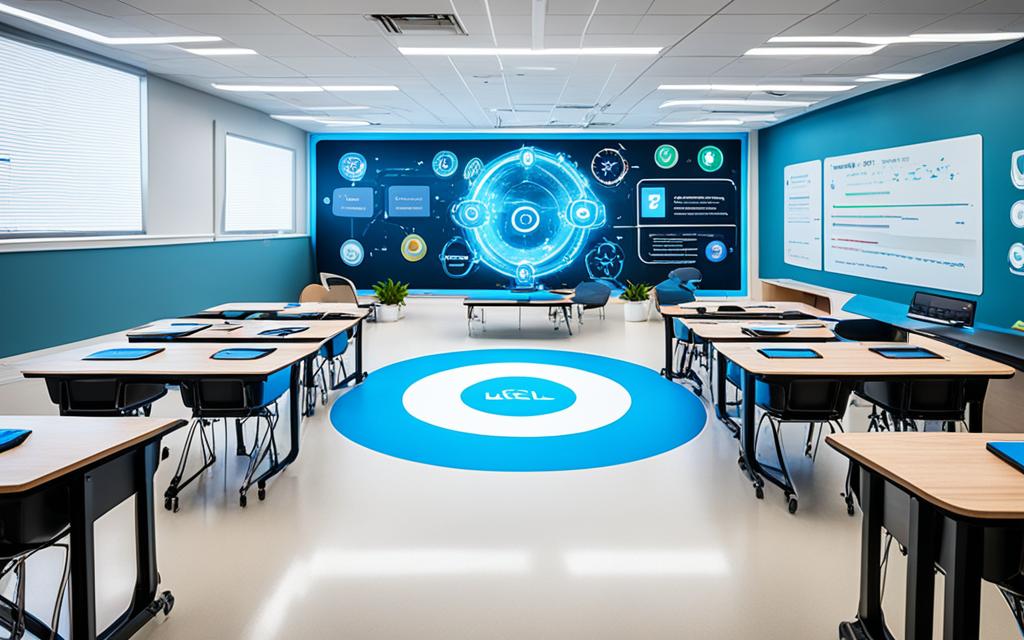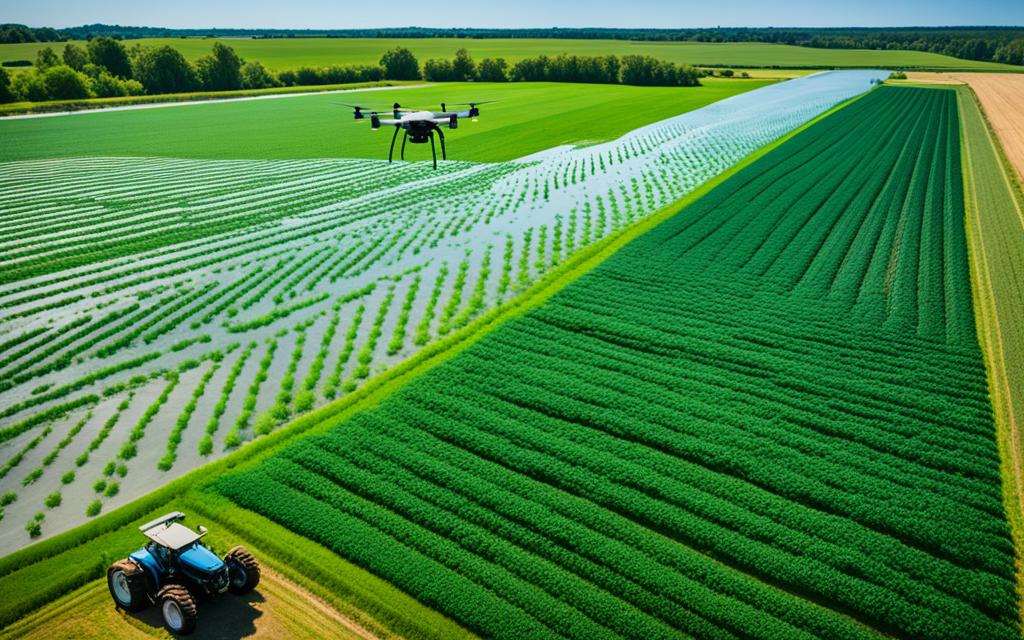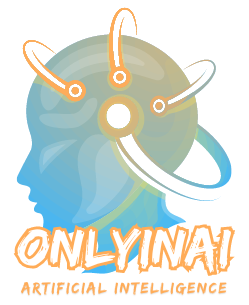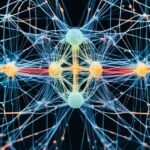Did you know 97% of mobile users use AI-powered voice assistants? This fact shows how much artificial intelligence is part of our daily lives. AI changes how we work, live, and have fun, from our phones to big industrial processes.
Natural language processing lets machines understand and talk back to us with great accuracy. AI text generation is changing how we make content on different platforms. These are just a few ways AI is making a big impact in the real world.
We’re going to look at how AI is changing industries, making things more efficient, and opening new doors in areas like healthcare and entertainment. AI’s effects are huge and its future looks endless.
Key Takeaways
- AI is widely used in everyday mobile applications
- Natural language processing enables human-like communication with machines
- AI text generation is transforming content creation
- AI applications span across various industries
- Artificial intelligence is enhancing productivity and efficiency
- AI’s impact on society is significant and growing
Introduction to AI in Everyday Life
Artificial Intelligence (AI) is now a big part of our daily lives. It changes how we work, talk, and solve problems. From smart homes to advanced healthcare, AI is making a big impact.
Definition of Artificial Intelligence
AI means computer systems that can do tasks that need human smarts. These systems learn from data and adjust to new info. They use technologies like machine learning and deep learning.
The Growing Prevalence of AI
AI is spreading fast in many areas. Chatbots have changed customer service. Now, smart assistants like Siri and Alexa are common. AI also helps us find what we want online.
Impact on Various Industries
AI is changing many sectors, bringing new ideas and making things more efficient. Here’s how AI is affecting different industries:
| Industry | AI Application | Benefits |
|---|---|---|
| Healthcare | Diagnostic tools, drug discovery | Improved patient outcomes, faster research |
| Finance | Fraud detection, algorithmic trading | Enhanced security, optimized investments |
| Manufacturing | Predictive maintenance, quality control | Reduced downtime, improved product quality |
| Retail | Personalized recommendations, inventory management | Enhanced customer experience, optimized stock levels |
As AI keeps getting better, we’ll see more ways it changes our lives and industries.
Healthcare and Medical Advancements
AI is changing how we care for patients and do medical research. It’s making diagnostics better and tailoring medicine to each patient. This is a big change in the medical world.
AI is great at finding diseases early. It looks at medical images and is often better than doctors at spotting problems. This means patients can get help sooner and have better chances of recovery.
AI is also speeding up the search for new medicines. It goes through lots of data fast, finding possible treatments quicker and cheaper than before.
“AI is not just a tool in healthcare; it’s becoming an indispensable partner for medical professionals.”
Telemedicine has gotten a big boost from AI. Virtual health assistants use AI to help patients 24/7. They answer questions and give advice on symptoms and treatments.
| AI Application | Benefit |
|---|---|
| Diagnostic Imaging | Faster, more accurate detection of diseases |
| Drug Discovery | Reduced time and cost for developing new medications |
| Telemedicine | Improved access to healthcare services |
| Personalized Medicine | Tailored treatments based on individual patient data |
Wearable devices and IoT sensors send health data to AI for analysis. This helps predict and manage chronic conditions. It’s making healthcare proactive, leading to better patient outcomes and fewer hospital visits.
Mental health care is also getting a boost from AI. Chatbots and virtual therapists offer support anytime for those dealing with mental health issues.
AI in Financial Services and Banking
The financial sector is going through a big change thanks to AI. AI is now helping with fraud detection and making banking more personal. Let’s look at some key areas where AI is changing finance.
Fraud Detection and Prevention
AI virtual assistants are leading the fight against fraud. They check transaction patterns in real-time to spot suspicious activities early. Banks use AI to look through lots of data, catching fraud with great accuracy.
Algorithmic Trading
Wall Street is using AI for quicker, smarter trading. AI algorithms can go through market data super fast, making trades in a flash. These systems learn from market trends, adjusting strategies to get the best returns while taking less risk.
Personalized Banking Experiences
AI is changing how banks help customers. Chatbots powered by advanced AI give 24/7 support, answering questions and helping with complex tasks. These AI helpers get better with each chat, giving more tailored advice and tips.
“AI is not just changing banking; it’s redefining the entire financial landscape. From fraud prevention to personalized services, AI is making finance smarter, safer, and more accessible.”
As AI keeps getting better, we’ll see more new uses in finance. The future of banking is here, and it’s all thanks to artificial intelligence.
Transforming Education with AI

Artificial Intelligence is changing education, making learning more personal for students around the world. AI uses data to understand what each student needs. It then adjusts the content to fit those needs, making learning more effective.
AI helps teachers by making educational materials quickly and easily. It can create practice questions, summaries, and lesson plans. At the same time, it helps teachers understand how students feel and if they are engaged in online classes.
Virtual tutors powered by AI offer help to students anytime, explaining tough topics clearly. These AI assistants answer questions, give feedback, and even mimic one-on-one tutoring.
“AI is not replacing teachers; it’s empowering them to be more effective and focus on what matters most – inspiring and guiding students.”
AI is breaking down language barriers in education. It provides real-time translation, making it easier for students to work with teachers from other countries. This means students can learn from top educators globally, no matter their first language.
AI also makes administrative tasks easier for teachers. It handles things like grading and scheduling, so teachers can focus on teaching. This lets them encourage creativity and critical thinking in their students.
AI Usage Examples in Manufacturing and Industry
Manufacturing and industry are seeing a big change with AI. Smart factories use AI for many tasks, making them more efficient and improving quality. Let’s look at some key ways AI is being used in this field.
Quality Control and Predictive Maintenance
AI-powered systems can spot product defects with amazing accuracy. They use computer vision and machine learning to catch things humans might miss. This means better product quality and fewer recalls.
Predictive maintenance is also changing the game. AI looks at sensor data to predict when machines need fixing. This cuts down on downtime and saves money on repairs you don’t need.
Supply Chain Optimization
AI is making supply chains run smoother. It looks at lots of data to predict demand, manage inventory, and improve logistics. This leads to fewer stockouts and less waste.
| Supply Chain Area | AI Benefit |
|---|---|
| Demand Forecasting | Improved accuracy by 25-50% |
| Inventory Management | Reduced carrying costs by 20-30% |
| Route Optimization | Decreased transportation costs by 15-20% |
Robotics and Automation
AI-powered robots are changing the factory floor. They do tasks like assembly, welding, and packaging fast and accurately. These robots can work all the time, increasing productivity.
Digital twins, which are virtual copies of real systems, let us monitor and improve production in real-time. Engineers use these AI models to test and better production without stopping operations.
“AI in manufacturing isn’t just about automation. It’s about creating smarter, more responsive systems that can adapt to changing conditions in real-time.”
As AI keeps getting better, we’ll see more new uses in manufacturing and industry. The mix of AI and data analysis is leading to smarter, more efficient factories of the future.
Enhancing Customer Service with AI
AI is changing how we handle customer service. Now, businesses use conversational AI for support any time. AI chatbots quickly answer customer questions, letting human agents focus on harder issues. These virtual assistants talk like humans thanks to natural language processing.
AI looks at customer data to give them a personalized experience. It checks buying habits, likes, and past purchases. This means customers get product suggestions and deals just for them. AI also figures out how customers feel, helping businesses respond better.
| AI Feature | Customer Service Benefit |
|---|---|
| 24/7 Availability | Instant support at any time |
| Natural Language Processing | Human-like conversations |
| Data Analysis | Personalized recommendations |
| Sentiment Analysis | Emotion-aware responses |
AI chatbots make customer support better by taking care of simple questions. This lets human agents deal with tough issues that need empathy and deep thinking. This means customers get help quicker and are happier.
“AI in customer service isn’t about replacing humans. It’s about empowering them to deliver exceptional experiences.”
As AI gets better, we’ll see more advanced AI virtual assistants. These will make customer interactions smoother and more tailored than ever.
AI in Transportation and Autonomous Vehicles
The transportation sector is undergoing a big change thanks to artificial intelligence. AI is changing how we travel and manage traffic. It’s making our roads safer and travel more efficient.
Self-Driving Cars and Safety Improvements
Self-driving cars are a big deal in transportation. They use sensors and learning algorithms to move safely. Companies like Tesla are adding features like lane-keeping and adaptive cruise control. These systems aim to cut down on human mistakes and make roads safer.
Traffic Management Systems
AI is changing how cities handle traffic. It uses data to predict traffic jams and adjust signals. This makes traffic smoother and cuts down on wait times for drivers. AI’s effect on transportation goes beyond cars to whole cities.
Logistics and Route Optimization
In logistics, AI is changing how we plan routes. Companies use AI to look at lots of data, like traffic and weather. This helps them find the best routes, saving time and fuel. It makes transportation more green and cost-effective.
| AI Application | Benefits |
|---|---|
| Self-Driving Cars | Improved safety, reduced human error |
| Traffic Management | Reduced congestion, optimized traffic flow |
| Route Optimization | Fuel savings, faster deliveries |
As AI gets better, we’ll see more new uses in transportation. We can look forward to smarter public transit and flying taxis. The future of travel is looking smart and efficient.
Agriculture and Environmental Applications

AI is changing how we farm. It helps farmers use data to make better decisions. By analyzing information on soil, weather, and plant health, farmers can improve crop yields.
Autonomous tractors are now a big part of farming. These tractors can do many tasks on their own, like plowing and seeding. This makes farming more efficient and reduces waste.
AI is also important for protecting nature. It helps researchers track endangered animals by analyzing photos from cameras. This makes it faster and more accurate to count how many animals there are.
AI helps predict the weather and understand climate changes. These predictions help communities prepare for disasters. It’s a big step in protecting our planet.
“AI is not just a tool for efficiency; it’s a partner in our efforts to create a sustainable future for agriculture and the environment.”
AI is leading to new ways to monitor crops and protect the environment. As these technologies grow, they will help us make our planet more sustainable and productive.
AI in Entertainment and Gaming
AI is changing entertainment and gaming, making them more fun and personal. It helps with smart recommendations and creates new art. This is changing how we watch movies and play games.
Content Recommendation Systems
Streaming sites use AI to learn what you like and suggest shows. They look at what you watch and recommend more of the same. For example, Netflix uses AI to guess what you’ll like based on what you’ve watched before.
AI-Generated Art and Music
AI is making new art and music. Artists and musicians use AI to create unique pieces. This mix of human and machine is opening up new ways to be creative.
Immersive Gaming Experiences
Gaming is getting better with AI. Characters in games act more like real people, making games feel more real. AI also makes graphics better, stories more dynamic, and games harder or easier as you play. These changes make games more engaging and fun.
| AI Application | Entertainment Impact | Gaming Impact |
|---|---|---|
| Content Recommendation | Personalized streaming suggestions | Game recommendations based on play style |
| AI-Generated Content | Unique art and music creations | Procedurally generated game worlds |
| Sentiment Analysis | Mood-based content curation | Adaptive gameplay difficulty |
As AI gets better, entertainment can match your mood, making experiences more emotional. The future of entertainment and gaming looks exciting, with AI leading the way in innovation.
Conclusion: The Future of AI Applications
AI is changing our lives fast, touching many areas we didn’t see coming. It’s making healthcare better and helping drive cars on their own. As technology gets better, AI will blend into our lives even more.
Natural language processing is getting smarter, making it easier for humans and machines to talk. This means better customer service, learning, and fun. AI will also help solve big problems like climate change and how to feed everyone.
But, we need to think about the right way to use AI. We must make sure it’s used in a way that’s good for everyone. By balancing new ideas with ethics, AI can make our lives better and help us all.


